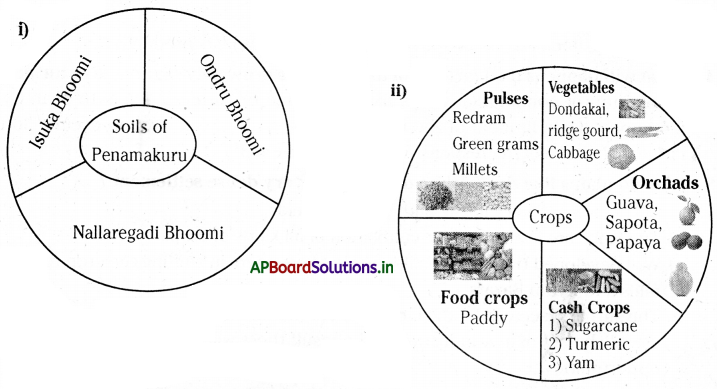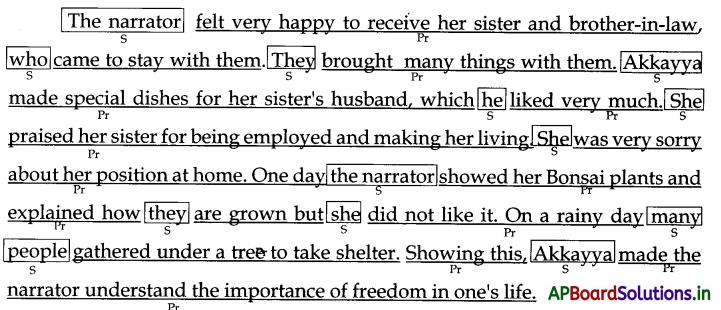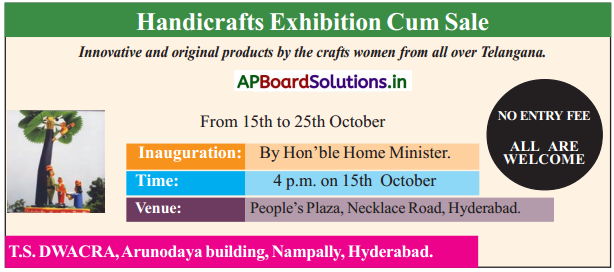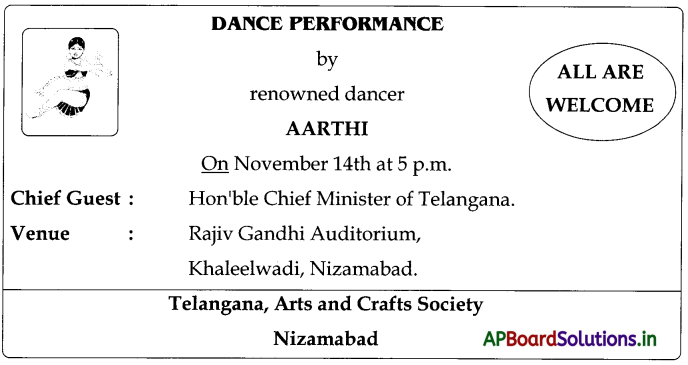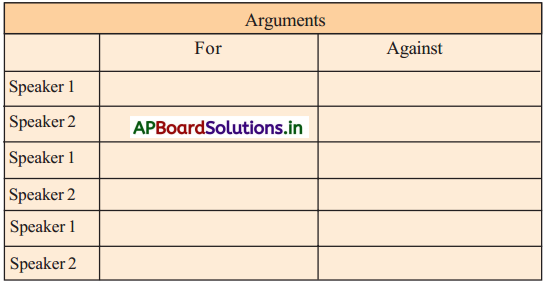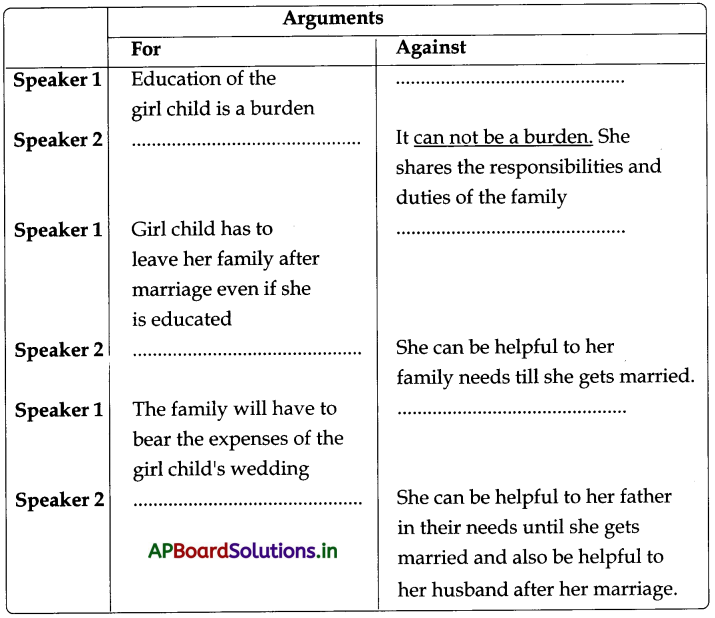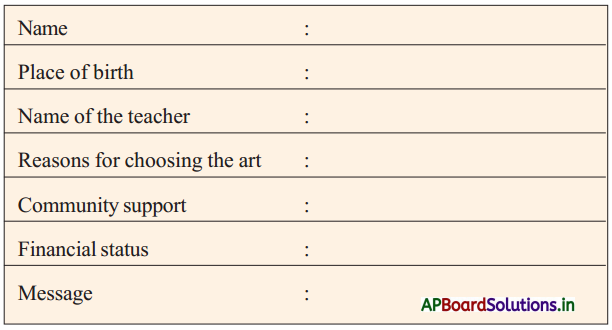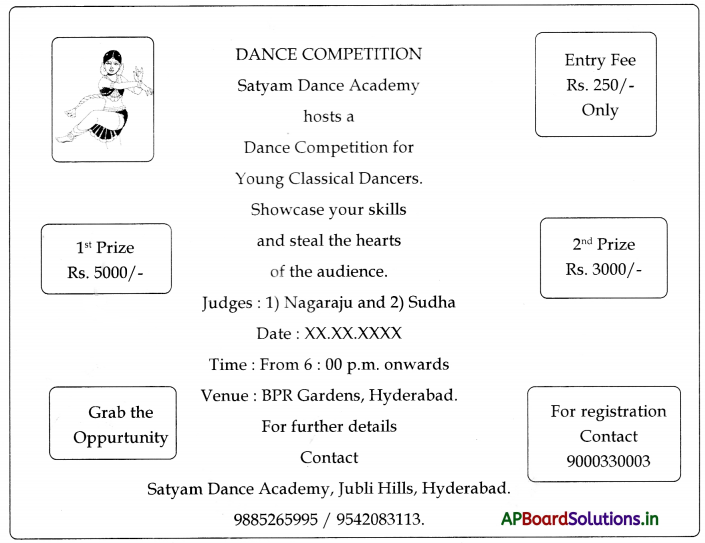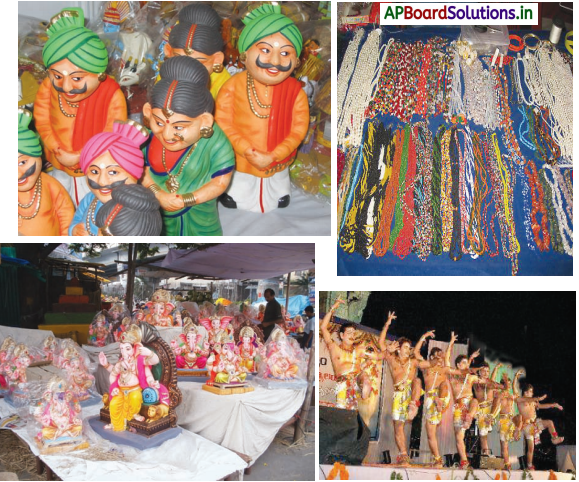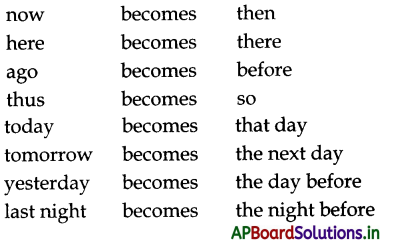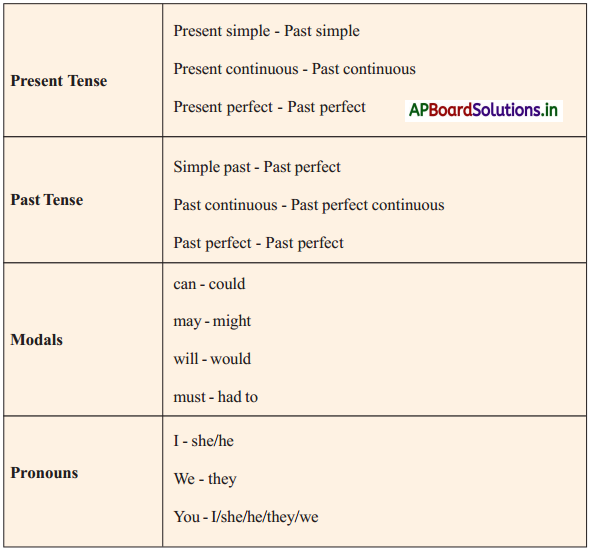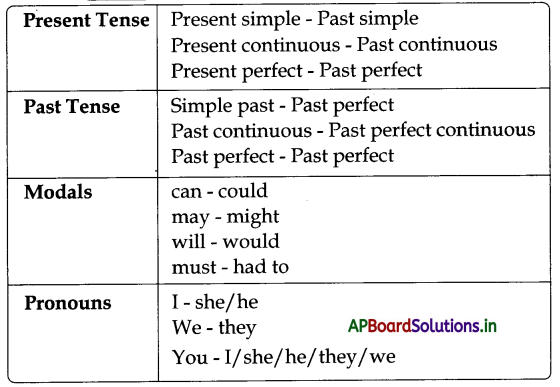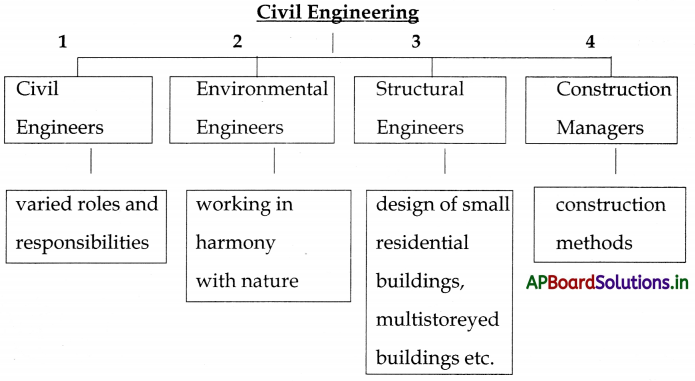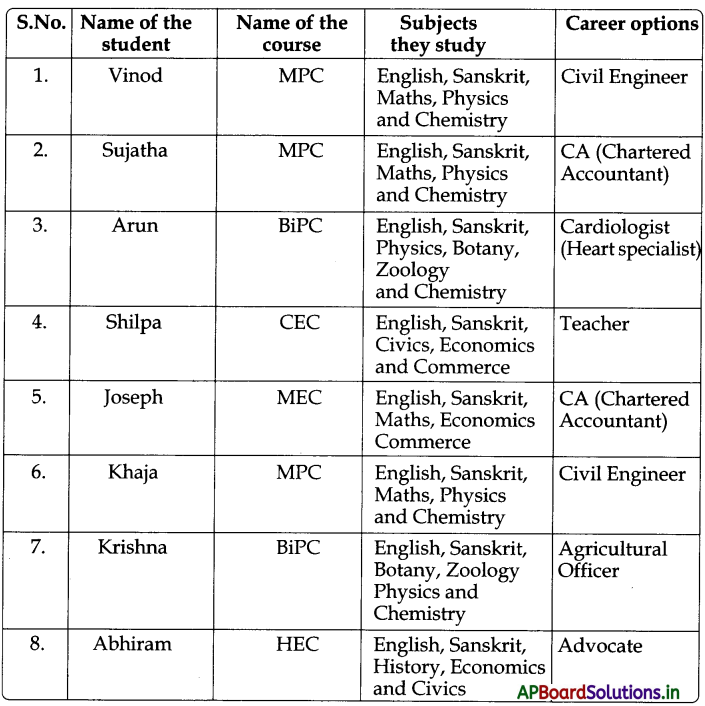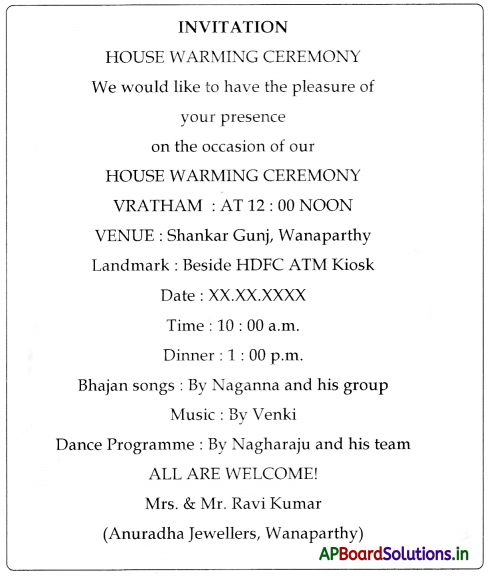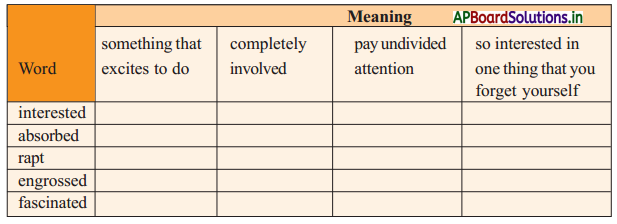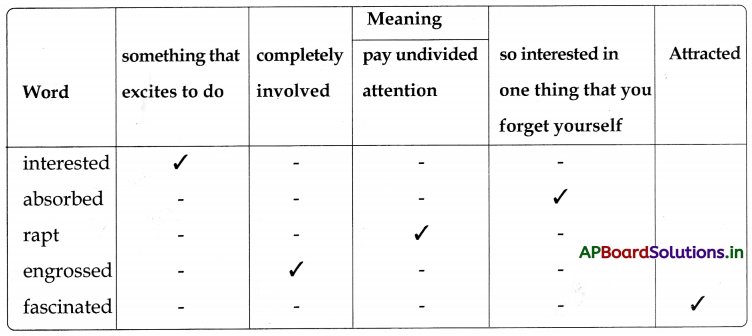Telangana SCERT TS 8th Class English Study Material Pdf Unit 7C I Can Take Care of Myself Textbook Questions and Answers.
TS 8th Class English Guide Unit 7C I Can Take Care of Myself
Answer the following questions.
Question 1.
What do you think is the most important thing to learn to live well ?
Answer :
The most important thing one has to learn to live well is that one has to stand on one’s own feet. He/She should find the work which supports him/her. He /She needs to learn more about the world.
Question 2.
What are the skills or qualities that would help you to be independent in your life?
Answer :
One should take care of oneself and those whom one loves. One should not depend on other person’s power, position and prosperity. The power, position and prosperity of others may not be accessible to one forever. So one has to stand on one’s own feet. One has to depend on the power within oneself to achieve the target in one’s life.
![]()
Question 3.
Do you agree/ disagree with the daughter of the mother rat? Give reasons for your response.
Answer :
I agree with the daughter of the mother rat, because dependency does not work in the long run. Things would never be the same in our life. The persons on whom we depend may not be with us. The power, position and prosperity may not be accessible to one forever. So one has to stand on one’s own feet. One has to depend on the power within oneself to achieve the target in one’s life.
Additional Questions :
Question 1.
Why did mother rat want her young daughter to get married to the most powerful being?
Answer :
The mother rat wanted her young daughter to get married to the most powerful being because she wanted to keep her daughter in safe hands.
Question 2.
Did the daughter of mother rat accept in being safe after marrying a powerful being? Why?
Answer :
The daughter of the mother rat did not accept in being safe after marrying a powerful being. She was very much aware of the independent life which could make her lead a happy life. She also strongly believed that one has to depend on power within oneself, to seek the target in one’s life. She also opined that there was no powerful being individually. The truly powerful being is the one who can take care of oneself and of those she/he loves.
Study Skills :
I. Observe the data given in the bar diagrams related to male and female infant mortality rates (IMR) in India over the years 1990 to 2008 and answer the questions given.
(Source: Ministry of Statistics and Programme Implementation National Statistical Organisation – Website: www.mospi.gov.in)

Question 1.
In which year is the difference in infant mortality rates between male and female the highest?
Answer :
The highest difference in infant mortality rates between male and female is observed in the year 2003 as per the data given in the diagram.
![]()
Question 2.
In which case and in which year do we find a sudden decrease in the IMR?
Answer :
We find a sudden decrease in the IMR in the case of male in the year 2003.
Question 3.
What will happen if there is a wide gap in IMR between male and female?
Answer :
If there is a wide gap in IMR, the ratio between male and female is imbalanced and it may lead to other complications in the society.
Question 4.
What, according to you, may the reasons be for the female IMR being higher than the male IMR?
Answer :
The female infants are not cared for properly by the parents, due to personal prejudices observed these days. A lot of discrimination is shown between male and female infants. Parents think that females are a burden on them. Because of their negligence in the case of female health conditions, the IMR in the female is higher than the male IMR.
Question 5.
What may the reasons be for the decrease in IMR rates over the years?
Answer :
There is a lot of decrease in IMR rates over the years because of the highly sophisticated technology and the revolutionary developments in the medical field. They might have controlled the death rate. The medicine and the treatment due to high technology may have saved the lives of infants.
Question 6.
Do you think there could be a further decrease in the IMR after 5 years?
Answer :
I think there would be a further decrease in the IMR after 5 years because day to day developments are being observed in medical field. New medicines are invented for the treatment of various dreadful diseases.
![]()
Question 7.
What, according to you, may the reasons be for the death of more than half of both male and female infants?
Answer :
In my view that was the time when there was no sophisticated technology and medicines to get proper treatment to cure diseases. That might have led to the increase of death rates compared to modern days.
II. Group work :
Discuss the above questions in your group and write an analytical report on the Infant Mortality Rates in India.
Answer :
When we observe the infant mortality rates in India, it was the highest particularly in the year 1990. Lack of medicine and technology in those days might have led to this. There was a drastic down fall in the death rate among the male infants in the year 2003. In the rest of the years the IMR rate had been marginalised and it was observed to be almost the same between the male and female. It was also noticed that the IMR rate of the females was higher than that of the males. A lot of discrimination on the female child by the parents might have led to various complications resulting in the death rate of female infants. Because of the personal prejudices in the society, the female infants were completely neglected when they suffered from diseases.
Oral Activity :
Debate on the following proposition.
“Reservation in education, employment and legislature will empower women.”
Answer :
Group I: There was an age – long prejudice against women. Man has dominated the female. He did not support woman’s education lest they should be humiliated. He made her a servant in the house. So woman had no voice in anything.
Group II : But times have changed. Now woman is educated. She can stand equal to man. She can advise the family.
Group III : If a woman is educated and is holding a job, she can have financial stability. She can meet her ends as well as support the family.
Group II : If she is given a chance to enter assembly, she can argue and improve the status of woman.
Group I, II, III : So woman should be given reservation in education, employment and legislature to improve her condition.
Project Work:
A. Interview some female members in your family and neighbourhood with the following questions.
Would you like the girls in the family to take up a job after they have received education?
If yes, give some reasons.
Answer :
My mother and some of our neighbours. Yes, we would like the girls in the family to take up a job after they have received education. Girls can take up the responsibilities and duties as efficiently as boys. There shouldn’t be any discrimination between girls and boys. It is an outdated prejudice and should no longer continue.
![]()
B. Work on the following items.
Note down whether the woman you have interviewed educated or uneducated; working / not working; married / unmarried.

Answer :
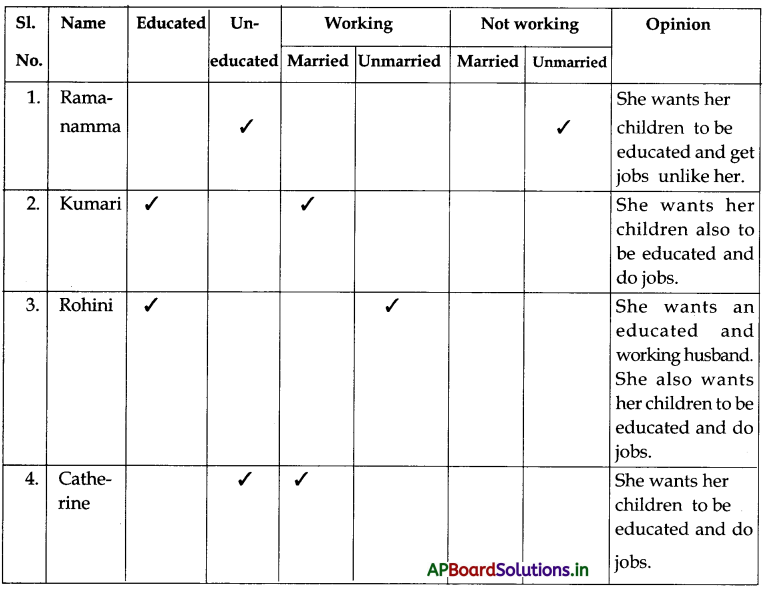
C. Based on the above information write a report on ‘Woman Empowerment’ and present it to the class.
Answer :
Based on the above information I felt that most of the women like their girls to take up jobs after they have received education. The days have changed. Women are proving themselves worthy in various fields and holding many responsibilities and duties. They like to stand on their feet. They want to lead in all walks of life.This is possible only because of the ‘Woman Empowerment.’
I Can Take Care of Myself Summary in English
Once there lived a mother rat. She wanted to get her young daughter married to the most powerful being on the earth. She went in search of the powerful being. She saw the sun god while he was moving across the sky. She asked him if he was the most powerful being on the earth. The sun god replied that he was not the most powerful and told that the rain god was greater than him. The mother rat went to the rain god and posed the same question. The rain god also did not accept it but told that the mountain god was the most powerful being. The mother rat went to the mountain with the same question but the mountain replied that the earthworm was the greatest being on the earth.
Meanwhile her daughter enquired of her mother rat whom she was searching for. The Mother rat explained to her daughter that if she got married to a powerful being, she would be safe in her life. Her daughter laughed at her mother’s words and said that one need not worry to be safe. One had to protect oneself to be safe. She assured her mother that she wouldn’t have to worry about her marriage for keeping her safe. The young rat assured that she would learn to stand on her own feet first. She also said that people who could protect themselves and those they loved would always be safe. Finally the daughter rat emphasized that depending on another’s powers, position and prosperity would never promise peace and security in the long run. She added that one had to depend on the power within oneself to achieve the target in one’s life.
![]()
Meanings :
1. protection : safety
2. prosperity : wealth
3. security : safety
Section – A : Reading Comprehension :
Read the following passage from ‘Bonsai Life’.
“Don’t think like that, Ammalu. How fortunate you are! Touchwood! You’ve studied well, have a job like a man and are earning very well. You don’t have to beg anyone for anything. You are able to lead a dignified life unlike us who have to depend on our husbands even for a few paise worth of karivepaku,” said Akkayya.
The grass is greener on the other side, I thought to myself. “What’s your daughter doing now?” I asked, changing the topic.
“She’s in her final year at school. If by God’s grace she clears her exams, I am determined to send her to college. Your Baavagaaru doesn’t really like the idea of sending her to the next town and putting her in a hostel. But I don’t like to keep a girl at home without educating her. Isn’t what I’m going through enough? In these times, if a woman doesn’t have a degree, she’ll come to nothing. Without it, she will have to live under her husband’s thumb, like a scorpion under a slipper,” she said.
(Q. 1-5) Now, answer the following questions. Each question has four choices. Choose the correct answer and write (A), (B), (C) or (D) in your answer booklet. 5 × 1 = 5 M
Question 1.
How fortunate ‘you’ are! Who does ‘you’ refer to in this line ?
A) Akkayya
B) Ammalu
C) Father
D) Husband
Answer:
B) Ammalu
![]()
Question 2.
What is the meaning of the expression ‘The grass is greener on the other side.’?
A) The grass on this side is green.
B) Others are as good as we are.
C) Others are in a better position than us.
D) The garden is filled with greenery.
Answer:
C) Others are in a better position than us.
Question 3.
Akkayya’s daughter was studying ……..
A) Ninth class
B) Top class
C) Eighth class
D) Seventh class
Answer:
B) Top class
Question 4.
Who does not like to put the girl in a hostel ?
A) The narrator
B) The narrator’s sister
C) The narrator’s brother
D) The narrator’s brother-in-law
Answer:
D) The narrator’s brother-in-law
![]()
Question 5.
According to the above passage, who should have a degree in these times?
A) Everyone
B) Women
C) Sisters
D) Brothers
Answer:
B) Women
(Q.6- 10) Answer the following questions in one or two sentences in your own words. 5 × 2 = 10 M
Question 6.
What were the thoughts of the narrator about her job ?
Answer :
The narrator thought that it was a wretched job. She felt like giving it up.
Question 7.
Why was Akkayya determined to send her daughter to college ?
Answer :
Akkayya was determined to send her daughter to college to get a degree. She did not want her daughter to suffer like her. She wanted her daughter to be strong and independent.
Question 8.
In what way is the narrator more fortunate than her sister ?
Answer :
The narrator was more fortunate than her sister because she was educated and employed. She was financially independent and did nto want to depend on her husband.
![]()
Question 9.
What is the meaning of ‘like a scorpion under a slipper’ ?
Answer :
The meaning of “like a scorpion under a slipper” is feeling totally suppressed.
Question 10.
Can one be independent without a job or earning ? Justify your answer.
Answer :
No one can be independent without a job or earning. Doing a job is not only for the sake of earning money but also being independent. It helps people to put their education into use.
Read the following story.
A four-year-old boy was in the market with his six-year-old sister. Suddenly the boy found that his sister was lagging behind. He stopped and looked back. His sister was standing in front of a toy shop and watching something with great interest. The boy went back to her and asked, “Do you want something?” The sister pointed at a doll. The boy held her hand and like a responsible elder brother, gave that doll to her. The sister was very happy. The shopkeeper was watching everything and getting amused to see the matured behaviour of the boy.
Now the boy came to the counter and asked the shopkeeper, “What is the price of this doll, sir?” The shopkeeper was a cool man and had experienced the odds of life. So, he asked the boy with lot of love and affection, “Well, what can you pay?” The boy took out all the shells that he had collected from the sea shore, from his pocket and gave them to the shopkeeper. The shopkeeper took the shells and started counting as if he were counting currency.
Then he looked at the boy. The boy asked him worriedly, “Is it less?” The shopkeeper said, “No, No… These are more than the price. So I will return the remaining.” Saying so, he kept only four shells with him and returned the remaining. The boy very happily kept those shells back in his pocket and went away with his sister. A servant in that shop got very surprised watching all this. He asked his master, “Sir! You gave away such a costly doll just four shells?”
The shopkeeper said with a smile, “Well, for us these are mere shells. But for that boy, these shells are very precious. And at this age, he doesn’t understand what money is, but when he grows up, he definitely will. And when he would remember that he purchased a doll with the shells instead of money, he will remember me and think that the world is full of good people. He will develop positive thinking. That’s it.”
(Q. 11- 12) Now, answer the following questions. Each question has four choices. Choose the correct answer and write (A), (B), (C) or (D) in your answer booklet. 2 × 1 = 2 M
Question 11.
Why did the girl lag behind ?
A) Because somebody stopped her.
B) Because the shop attracted her.
C) Because a doll attracted him.
D) Because a doll attracted her.
Answer :
D) Because a doll attracted her.
Question 12.
How many shells did the shopkeeper accept ?
A) All the shells
B) All the remaining shells
C) Forty shells
D) Four shells
Answer :
D) Four shells
![]()
(Q. 13 – 16) Answer the following questions in one or two sentences in your own words. 4 × 2 = 8 M
Question 13.
Who was standing in front of the shop? Who found her there?
Answer :
The girl was standing in front of the shop. Her younger brother found her there.
Question 14.
What did the shopkeeper do after taking shells from the boy?
Answer :
The shopkeeper took the shells and started counting as if he were counting currency.
Question 15.
What did the servant ask the master ?
Answer :
The servant asked the master why he had given away such a costly doll for just four shells.
Question 16.
Why do you think the shopkeeper sold the doll for just four shells ?
Answer :
I think the shopkeeper sold the doll for just four shells to make the boy remember him and think that the world is full of good people. He would also develop positive thinking.
Section – B : Vocabulary & Grammar :
(Q. 17 – 21) Read the following passage focusing on the parts that are underlined and answer the questions given at the end. Write the answers in your answer booklet. 5 × 1 = 5M
“You’ll (17) get run over by a car,” said Janet. She did not want to leave him there. So, she took her handkerchief out from (18) her pocket, wrapped (19) the toad up in it and carefully put him on the side of the road. She watched him struggling to crawl (20). “I must do something for his leg,” she thought (21). So, she picked him up again in her handkerchief and carried him home.
Question 17.
Write the full form of the underlined word.
A) You will
B) You all
C) You can
D) We will
Answer :
A) You will
![]()
Question 18.
Replace the underlined word with a suitable preposition.
A) in
B) of
C) with
D) to
Answer :
B) of
Question 19.
Write the antonym of the underlined word.
A) covered
B) unwrapped
C) diswrapped
D) miswrapped
Answer :
B) unwrapped
Question 20.
The underlined word is associated with ……
A) laughing
B) eating
C) movement
D) teaching
Answer :
C) movement
![]()
Question 21.
Add the ‘ing’ form to the underlined word.
A) thoughting
B) thinksing
C) thinking
D) thoughtsing
Answer :
C) thinking
(Q. 22 – 26) Complete the following passage choosing right words from those given below it. Each blank is numbered, and for each blank four choices (A), (B), (C) and (D) are given. Choose the correct answer from these choices and write (A), (B), (C) or (D) in your answer booklet. 5 × 1 = 5M
The zookeepers opened the door ………. (22) and lifted the child out of the exhibit. The doctors were already there. They checked the boy for signs of life. He was breathing! He was still ……….. (23)! The ambulance ………… (24) him to a nearby hospital. He ………. (25) a serious injury ………… (26) he recovered fully.
Question 22.
A) gentle
B) gentedly
C) gently
D) generatedly
Answer :
C) gently
Question 23.
A) alive
B) dead
C) die
D) death
Answer :
A) alive
![]()
Question 24.
A) rushes
B) rushing
C) rushed
D) was rushed
Answer :
C) rushed
Question 25.
A) has
B) have
C) having
D) had
Answer :
D) had
Question 26.
A) but
B) and
C) so
D) because
Answer :
A) but
(Q. 27 – 31) Read the following passage. Five sentences are numbered. Each numbered sentence has an error. Find the error and write the correct sentences in your answer booklet. 5 × 2 = 10 M
(27) Once upon a time, there is a mother rat who wanted to get her young daughter married as soon as possible, to the most powerful being that she could find. (28) ‘Who is the most powerful being on the earth?’ she asked herself. She saw the bright sun god travelling across the sky, and thought, ‘Surely, all beings depend on the sun. (29) The sun god is a most powerful being on this earth.’ (30) She asked the sun god, ‘Is you the most powerful being on this earth?'(31) He smiled, ‘No, there is one greater then me to help the creatures – it is the rain. Without the rain, no crop or tree would grow. There would be no water on earth:’
Answer :
27. there was a mother
28. powerful being on earth
29. The sun god is the most powerful being
30. Are you the most powerful being
31. One greater than me.
![]()
Section – C : Conventions of Writing :
(Q. 32) Read the following passage carefully and supply the punctuation marks (. , ? ” “) and capital letters, wherever necessary. Also correct the spelling of the underlined word. 5M
once a fox was walking throw a forest suddenly, he fell into a well. he held on tightly to some roots at the side of the well. He began to shout for help. A wolf heard the fox. He came and stood at the well Then he asked, Hello, foxy How did you fall into the well.
Answer :
Once, a fox was walking through a forest. Suddenly, he fell into a well. He held on tightly to some roots at the side of the well. He began to shout for help. A wolf heard the fox. He came and stood at the well. Then, he asked, “Hello, Foxy. How did you fall into the well ?”
Section-D : Creative Writing
(Question – 33) : 12M
A) In the lesson “Bonsai Life”, the author, Abburi Chayadevi, elucidates women’s lives and their feelings. Now write an essay on “Women’s Day”.
Answer :
Essay.
WOMEN’S DAY
March 8th is a global day that belongs to someone without the existence of whom no one can imagine our world, someone who is a kind mother, a caring sister, a good friend and a big helper. Yes! It’s she, a woman. Women play the most important and responsible role in a family, society and country’s success. Today women in almost all the societies are not confined to taking care of children, cooking food, cleaning the houses, but also working in big organisations on important posts as managers and business owners.
Women should have equal rights to get education, equal employment opportunities and to have their say in any decision taken for their career or future lives. Contrary to past, in recent years violence against women has increased and we hear incredible and horrible stories of women domestic abuse through news especially in rural areas. Underage and forced marriages are common and a woman’s consent is not thought necessary in a decision that influences her entire life.
Education is one of the key factors to overcome differences. The life of an educated woman is completely different from that of an uneducated woman who is deprived of this universal right. As said by scholars, a child says give me an educated mother, I will give you an educated nation. Thus, it is imperative to understand the importance of women’s education. Only education can break the vicious circle of poverty. Having education and economic independence are the two fundamental factors for women that help in the overall development of the community.
If the society treats women as equally as men, gives them the status they deserve, provides them the opportunity to get education and choose a career for their future and take part in political, social and economic issues of the country, the country will move towards a prosperous
future. Only by celebrating women’s Day and talking about their issues, the problems will not be solved. We need to take action. To make this possible, we need to establish community centres and other awareness programmes in rural areas which can help promote awareness among women of their rights and responsibilities in the society. Government and religious leaders should try to change laws and practices that allow gender discrimination.
Every body wishes to see the nation where men and women work together without any discrimination.
![]()
(OR)
B) Imagine your sister got married. She has a five-year-old son. You have great love for your infant nephew. Now, write a letter to your sister inviting her to spend the upcoming summer holidays in your village.
Answer :
Letter to Sister
H. No. 2-3 / 2,
Vanasthalipuram,
Hyderabad.
Dt : XX.XX.XXXX
My dear sister,
I’m doing well and hope to hear the same from you. I hope this letter finds you in high spirits. How is Lucky doing?
I write this letter to cordially invite you to spend the upcoming summer holidays with us in Hyderabad. I have heard that Lucky’s exams will get over in a couple of days. I hope he is doing well in the ongoing exams. I am sure that you and Lucky are eager to visit Hyderabad, right after his Annual Exams. He had a wonderful time here with us last time. This time we have bought a mini scooter for him. He will definitely have a more wonderful time. He will enjoy riding the toy scooter. Everybody in the family is eagerly waiting for you and Lucky. I hope you will soon reply to me.
Convey my regards to brother – in – law and give my kisses to Lucky.
With lots of love,
Your loving brother,
XXXXX
Address on the Envelope
To
B. Santhoshni
W/o. B. Ravi,
H.No. 1-5-409,
Beside SBH,
Bethancherla.
![]()
(Question – 34) : 8M
A) Imagine yourself as an English author. You propose to release a book next week. Now design an invitation card for the ‘Book Releasing Ceremony’. Incorporate the following ideas:
- Title of the book
- Chief Guest and Guests of Honour
- Who will inaugurate the book?
- Who will receive the first copy?
- Date & Time
- Venue
Answer :

(OR)
B) Imagine that your sister lives in Delhi. Now write a message to your sister about your visit to her place.
Answer :
Message
Dt : X X . X X . X X X X
4: 30 PM
Dear Sister,
You know, I have been selected for a cricket tournament to be held in Delhi. I am really excited about it. The first match is on 20th August. We are all working hard as a team for achieving success in the big tournament. Right after the first match, I will pay a visit to your place, please, convey the same to brother – in – law.
Yours,
XXXX
![]()
Additional Exercises :
Section – A : Reading Comprehension :
(Questions 1 – 10)
EXERCISE – 1
Read the following passage from ‘Bonsai Life – II’.
“But, Ammalu, what’s this? Why have you planted the turayi and pomegranate trees in these flowerpots? See, how stunted they have become! If, like flower plants, you put these trees in pots instead of letting them grow freely in the backyard, how will they grow?” she asked, surprised, feeling sorry for the trees.I burst in to laughter. Akkayya was perplexed.”I did it on purpose. It’s a special method. It’s called bonsai in Japan.
You can grow even a huge banyan tree in a flower pot. You can grow it even with its roots hanging down from the branches. You have no idea how beautiful a pomegranate tree looks when you keep cutting its branches, changing the pot now and then, trimming it into a small-sized tree and making it bear fruit! Do you know how carefully you have to tend this small tree? Bonsai is a great art” I said.
But it seemed as if Akkayya didn’t appreciate what I said. “I don’t know. You have confined a turayi tree to a flowerpot when it could have grown to the height of a building,” she sighed.
(Q. 1 – 5) Now, answer the following questions. Each question has four choices. Choose the correct answer and write (A), (B), (C) or (D) in your answer booklet. 5 × 1 = 5M
Question 1.
What were planted in the flowerpots ?
A) Plants
B) Flowers
C) Plants and flowers
D) The turayi and pomegranate trees
Answer :
D) The turayi and pomegranate trees
Question 2.
Who felt sorry for the trees?
A) The narrator’s neighbor
B) The narrator
C) The narrator’s mother
D) The narrator’s sister
Answer :
D) The narrator’s sister
![]()
Question 3.
The narrator plant the trees in the flowerpots
A) simply
B) casually
C) really
D) purposefully
Answer :
D) purposefully
Question 4.
Bonsai is a great ……
A) art
B) painting
C) drawing
D) game
Answer :
A) art
Question 5.
What could have grown to the height of a building?
A) The turayi tree
B) The pomegranate tree
C) The flowerpots
D) The branches
Answer :
A) The turayi tree
![]()
(Q.6 – 10) Answer the following questions in one or two sentences in your own words. 5 × 2 = 10 M
Question 6.
Why have the trees become stunted in the flowerpots ?
Answer :
The trees have become stunted in the flowerpots because they are not allowed to grow naturally.
Question 7.
Why was Akkayya perplexed ?
Answer :
Akkayya was perplexed because she did not understand how a big tree could grow in a small flowerpot.
Question 8.
How is a bonsai reared ?
Answer :
Bonsai trees are very small in size. They can be grown even in small flowerpots. If they are treated properly, then can bear fruit also. This is the special method of growing trees called bonsai in Japan.
Question 9.
Who did not appreciate the words of the narrator?
Answer :
Akkayya (the narrator’s elder sister) did not appreciate the words of the narrator.
Question 10.
Do you support bonsai ? If yes / no why?
Answer :
No, I never support bonsai because it is not suggested to confine a tree which can grow to the height of a building to a flowerpot.
![]()
EXERCISE – 2
Read the following passage from ‘Bonsai Life I’.
The moment I see letters waiting for me on the doorstep when I return from work, I can’t contain my excitement. It’s almost as if I’m face to face with my near and dear ones and they are speaking affectionately to me. Instantly the exhaustion of office work vanishes and my heart grows light. Instead of entering the kitchen muttering, ‘0h no, 0 ~h God’-which is what I usually do when I come back tired – I feel like singing a song, humming a tune, making a nice cup of coffee and savouring each sip. What is more, the sight of inland letters or envelopes in a familiar hand gives me the energy and enthusiasm to quickly make and eat some pakodas or bajjis! Even though I am lazy about writing letters I love to receive one from some place or the other, every day.
This is an unexpected letter. If my Akkayya, who doesn’t normally write, went out of her way to write a letter, there has to be a reason. As I open the letter, I am a little apprehensive. I hope it is not some bad news. Actually, when things are fine, no one bothers to write …
Ammalu!
You must be very surprised to receive my letter. You would be even more surprised if I were to tell you that your Baavagaru and I are coming to your place. We have been planning for quite a while to visit Kasi and Haridwar. We have now found the time. I hope you won’t find our visit inconvenient.
(Q. 1 – 5) Now, answer the following questions. Each question has four choices. Choose the correct answer and write (A), (B), (C) or (D) in your answer booklet. 5 × 1 = 5M
Question 1.
The narrator is excited to receive
A) work
B) letters
C) talks
D) guests
Answer :
B) letters
Question 2.
The meaning of the word ‘exhaustion’ is ………..
A) Extreme fatigue
B) Extreme entertainment
C) Extreme anger
D) Extreme rules
Answer :
A) Extreme fatigue
![]()
Question 3.
What does the narrator feel like sipping ?
A) Songs
B) Tunes
C) Tea
D) Coffee
Answer :
D) Coffee
Question 4.
The narrator loves to receive letters
A) daily
B) weekly
C) monthly
D) yearly
Answer :
A) daily
Question 5.
What are Kasi and Haridwar?
A) Capital cities
B) Hitech cities
C) Holy places
D) Metro Cities
Answer :
C) Holy places
(Q.6 – 10) Answer the following questions in one or two sentences in your own words. 5 × 2 = 10 M
Question 6.
“The moment I see letters can’t contain my excitement.” Why does the narrator get excited ?
Answer :
The narrator gets excited when she sees letters because affectionate letters from her near and dear ones make her feel happy and relaxed.
Question 7.
What gives the narrator the energy and enthusiasm to quickly make and eat junk food?
Answer :
The sight of inland letters or envelopes in a familiar hand gives the narrator the energy and enthusiasm to quickly make and eat junk food.
![]()
Question 8.
What does the narrator do when she comes back tired?
Answer :
When the narrator comes back tired, she enters the kitchen muttering, ‘ Oh no, Oh God.’
Question 9.
Who wrote the letter to whom ? Why ?
Answer :
The narrator’s elder sister wrote the letter to the narrator about her visit to her sister’s place for the first time since her sister’s marriage.
Question 10.
What did Akkayya hope ?
Answer :
Akkayya hoped that her sister would not find the visit of her brother – in – law and elder sister inconvenient.
EXERCISE – 3
Read the following passage from ‘I Can Take Care of Myself’.
‘But why would you need to work? If you marry someone rich and powerful, he will support you’, said the mother rat.’ ‘Who is rich and powerful, amma?’ asked the daughter. ‘The truly powerful being is one who can take care of oneself and those she loves. One is truly rich, if one is rich in love. I want to be powerful myself, so that I can take care of myself and those that I love.
‘The mother rat was confused. What will you do?’ she asked. ‘I will learn to stand on my own feet. I will find work to do that supports me, and my family. For that, I need to learn more about the world, and learn to live in it as a good creature. Let me first learn to take care of myself.’
‘But don’t you need help?’ asked the mother rat. Yes, from you, amma!’ said the daughter. ‘Help me support myself. I am not interested in marrying anybody, rich or powerful. Depending on another person’s power, position or prosperity does not promise peace and security in the long run.0ne has to depend on the power within oneself to seek the target in one’s life.’
(Q. 1 – 5) Now, answer the following questions. Each question has four choices. Choose the correct answer and write (A), (B), (C) or (D) in your answer booklet. 5 × 1 = 5M
Question 1.
‘But why would you need to work?’ Who said these words to whom ?
A) The daughter said to the mother rat
B) The son said to the mother rat
C) The sun said to the mother rat
D) The mother rat said to the daughter
Answer :
D) The mother rat said to the daughter
![]()
Question 2.
What will the daughter learn?
A) How to choose a bridegroom
B) How to live dependently
C) How to live independently
D) How to stand properly
Answer :
C) How to live independently
Question 3.
What type of work will the daughter find?
A) The work that supports her
B) The work that supports her family
C) The work that supports the world
D) The work that supports her and her family
Answer :
D) The work that supports her and her family
Question 4.
The daughter needs help from
A) Her mother
B) The sun god
C) You
D) The rain
Answer :
A) Her mother
Question 5.
What type of text is this passage?
A) Speech
B) A detailed report
C) Review
D) Story
Answer :
D) Story
![]()
(Q.6 – 10) Answer the following questions in one or two sentences in your own words. 5 × 2 = 10 M
Question 6.
What do you think is the most important thing to live well ?
Answer :
The most important thing to live well is learning to depend on one’s own power within oneself to reach the target in one’s life.
Question 7.
What are the skills or qualities that would help you to be independent in your life?
Answer :
The skills or qualities that would help me to be independent in my life are protecting myself, being strong have the ability to work hard, taking care of myself.
Question 8.
Do you agree or disagree with the daughter of the mother rat? Give reasons for your response.
Answer :
Yes, I do agree with the daughter of the mother rat. The daughter represents modern women their strength and individuality.
Question 9.
Why is the daughter of the mother rat not interested in marrying anybody, rich or powerful ?
Answer :
The daughter of the mother rat is not interested in marrying anybody, rich or powerful because her concept is depending on another person’s power, position or prosperity does not promise peace and security in the long run.
![]()
Question 10.
How can one reach the target in one’s life?
Answer :
One can reach the target in one’s life by depending on the power within oneself.
EXERCISE – 4
Read the following passage from ‘Bonsai Life II.
“What’s so surprising about that?” I asked.
“Not that it is surprising,Ammalu. Look at the bonsai you have tended so lovingly! It looks proper and sweet, like a housewife. But see how delicate it is. You have to tend it very carefully. It can’t even withstand a small dust storm or squall. When it is dependent on someone, how can it provide shelter to anyone? Isn’t it because of the difference in the way one brings up a boy and a girl, that a woman’s life is like that of a bonsai?”
My heart was touched by Akkayya’s words. Just as one frees a bird from a cage to let it fly, I felt the urge to free the bonsai trees from their flower pots.
(Q. 1 – 5) Now, answer the following questions. Each question has four choices. Choose the correct answer and write (A), (B), (C) or (D) in your answer booklet. 5 × 1 = 5M
Question 1.
“What’s so surprising about ‘that’? What does ‘that’ refer to ?
A) The pomegranate tree protecting many people
B) The turayi tree protecting many people
C) The sand storm raising lots of dust
D) The people are suffering from the sun’s heat
Answer :
B) The turayi tree protecting many people
Question 2.
The bonsai tree is compared to
A) A woman
B) A man
C) Humans
D) A homemaker
Answer :
D) A homemaker
![]()
Question 3.
What is the meaning of the word ‘squall’ ?
A) A heavy rain
B) A strong wind
C) A strong air
D) A blazing flame
Answer :
B) A strong wind
Question 4.
Who changed the mindset of the narrator finally?
A) Herself
B) Her Akkayya
C) Her Ammalu
D) Her husband
Answer :
B) Her Akkayya
Question 5.
What type of text is the above passage ?
A) Essay
B) Speech
C) Conversation
D) Story
Answer :
D) Story
![]()
(Q.6 – 10) Answer the following questions in one or two sentences in your own words. 5 × 2 = 10M
Question 6.
What similarities do you notice between the bonsai tree and the housewife ?
Answer :
A bonsai tree is well protected and carefully tended. A housewife is also well protected and carefully tended.
Question 7.
What made the narrator feel the urge to free the bonsai ?
Answer :
The narrator understood that a bonsai tree was unable to provide shelter, withstand a strong breeze or a dust storm. Bonsai trees require a lot of care, attention and responsibility in order to make them grow according to the special method.
Question 8.
How does the bonsai look?
Answer :
The bonsai looks proper and sweet, like a house wife.
Question 9.
What can’t withstand a small dust storm or a strong wind ?
Answer :
The bonsai tree reared by the narrator can’t withstand a small dust storm or a strong wind.
Question 10.
What is the central theme of ‘Bonsai Life’?
Answer :
The narrator brings out a contrast of women and bonsai trees. A less educated home maker grows dependently where as an educated and employed woman grows independently.
![]()
(Questions 11 – 16)
EXERCISE -1
Read the following poem.
The Bangle Sellers
Bangle sellers are we who bear Our shining loads to the temple fair… Who will buy these delicate, bright Rainbow-tinted circles of light? Lustrous tokens of radiant lives, For happy daughters and happy wives. Some are meet for a maiden’s wrist, Silver and blue as the mountain mist, Some are flushed like the buds that dream On the tranquil brow of a woodland stream, Some are aglow wth the bloom that cleaves To the limpid glory of new born leaves.
Some are like fields of sunlit corn, Meet for a bride on her bridal morn, Some, like the flame of her marriage fire, 0 r}, rich with the hue of her heart’s desire, Tinkling, luminous, tender, and clear, Like her bridal laughter and bridal tear.
Some are purple and gold flecked grey For she who has journeyed through life midway, Whose hands have cherished, whose love has blest, And cradled fair sons on her faithful breast, And serves her household in fruitful pride, And worships the gods at her husband’s side.
– Sarojini Naidu
(Q. 11 – 12) Now, answer the following questions. Each question has four choices. Choose the correct answer and write (A), (B), (C) or (D) in your answer booklet. 2 × 1 = 2 M
Question 11.
Who sings the above given poem in the form of a song?
A) Sarojini Naidu
B) Bangle sellers
C) Maidens
D) Happy daughters
Answer :
B) Bangle sellers
![]()
Question 12.
The bright bangles are the symbol of …….
A) Women
B) Happiness
C) Marriage
D) Brightness
Answer :
B) Happiness
(Q. 13 – 16) Answer the following questions in one or two sentences in your own words. 4 × 2 = 8 M
Question 13.
What coloured bangles are suitable for a bride on bridal morn ?
Answer :
Light yellow coloured (like fields of sunlit corn) bangles are suitable for a bride on a bridal morn.
Question 14.
‘Or rich with the hue of her heart’s desire’ – What do you understand from this line?
Answer :
Bangle sellers possess those coloured bangles which match the wishes of a bride.
Question 15.
Why does a bride laugh and shed tears ?
Answer :
A bride laughs because she is getting married and sheds tears because she is going to leave her parental residence.
![]()
Question 16.
How many stages of a woman are skillfully linked with the bangles ?
Answer :
Three stages of a woman are skillfully linked with the bangles. They are as follows : i) virgin ii) bride and iii) middle aged woman.
EXERCISE – 2
Observe the pie – chart given below.

(Q. 11 – 12) Now, answer the following questions. Each question has four choices. Choose the correct answer and write (A), (B), (C) or (D) in your answer booklet. 2 × 1 = 2 M
Question 11.
How many activities are displayed in the above pie-chart ?
A) 25 activities
B) 16 activities
C) Five activities
D) All activities
Answer :
C) Five activities
Question 12.
What percentage of students enrolled in drawing ?
A) 25 %
B) 21 %
C) 24 %
D) 14 %
Answer :
D) 14 %
![]()
(Q. 13 – 16) Answer the following questions in one or two sentences in your own words. 4 × 2 = 8 M
Question 13.
What does the above pie-chart display?
Answer :
The above pie-chart displays the percentage of students enrolled in different activites in a school.
Question 14.
Which activity got the highest percentage ?
Answer :
Craft got the highest percentage.
Question 15.
Which activity got more percentage – singing or dancing ?
Answer :
Dancing got more percentage than singing.
Question 16.
Which two activities got the lowest percentage ?
Answer :
Drawing (14 %) and swimming (16%) got the lowest percentage.
EXERCISE – 3
Read the following story.
Krishna was born into a family of five. Early in life, he learnt about the hardships of his life and started helping his father in his work. The scarcity of food and clothes was a part and parcel of his life. He was not ashamed of the sordid poverty in which he had been brought up. Instead, he was extremely proud of his parents who worked day and night to feed the family. His only sorrow was his illiteracy. He could not read or write. It pained him to see other children in the neighbourhood sitting around their homes happily laughing at colourful storybooks and scribbling down stories for their teachers. He felt sad looking at the neatly dressed school-going children. He promised himself
that he would educate himself and free his family from the claws of poverty. In the hope of gaining some knowledge, he used to go to a nearby school and sit outside listening to the teachers. He followed classes in English and Maths and especially enjoyed the story-telling sessions that always seemed to take place on Friday afternoons. He was often asked to leave the school grounds. However, this did not dampen his spirits. It made him bolder and more determined to educate himself.
![]()
(Q. 11 – 12) Now, answer the following questions. Each question has four choices. Choose the correct answer and write (A), (B), (C) or (D) in your answer booklet. 2 × 1 = 2 M
Question 11.
What type of text is the above passage ?
A) Description
B) Narrative
C) Speech
D) Conversation
Answer :
B) Narrative
Question 12.
How many members were there in the family of Krishna?
A) Five
B) Seven
C) Two
D) Three
Answer :
A) Five
(Q. 13 – 16) Answer the following questions in one or two sentences in your own words. 4 × 2 = 8 M
Question 13.
What did Krishna learn early in his life ?
Answer :
Early in life, Krishna learnt about the hardships of his life and started helping his father in his work.
![]()
Question 14.
What is the word used to describe ‘poverty’ in the above passage ?
Answer :
In the above passage, the word used to describe ‘poverty’ is ‘sordid’.
Question 15.
What pained Krishna ?
Answer :
Krishna saw other children in the neighbourhood sitting around their homes, happily laughing at colourful story books and scribbling down stories for their teachers. This pained Krishna.
Question 16.
What do you mean by the expression ‘dampen his spirits’ ?
Answer :
The expression ‘dampen his spirits’ means make him give up.
Section – B : Vocabulary and Grammar :
(Questions 17 – 21)
Read the following passages focusing on the underlined parts and answer the questions given at the end. Write the answers in your answer booklet. 5 × 1 = 5 M
EXERCISE – 1
Jim Corbett could read the jungle signs like a (17) open book. He could identify (18) a ripple in the dust of a dry stream bed or blade of grass catched (19) in the act of springing back from a crushed position. When stalking, he could use the wind like predators do, to either conceal (20) or reveal his presence. He could freeze stock-still in mid-stride for any amount of time, just like an animal. He could easily (21) read the sounds of the animals and could imitate them to perfection. Even the call of a tiger! With no assistance apart from his vocal chords, he could lure the animal to face-to-face meeting. Two man-eaters shot by him were cornered using this awesome ability.
Question 17.
Replace the underlined word with a suitable article.
A) an
B) the
C) a and an
D) no article
Answer :
A) an
![]()
Question 18.
The synonym of the underlined word is ….
A) realise
B) recognise
C) release
D) reality
Answer :
B) recognise
Question 19.
Replace the underlined word with the correct form.
A) catch
B) catching
C) catches
D) caught
Answer :
D) caught
Question 20.
The antonym of the underlined word is …
A) show
B) hide
C) discuss
D) overhear
Answer :
A) show
![]()
Question 21.
Rewrite the underlined word after removing its suffix.
A) easiest
B) easy
C) easily
D) ease
Answer :
B) easy
EXERCISE – 2
Kiran Bedi has reached a certain stratospheric (17) level, which she denies the intimacy of private life. Her yoga sessions is (18) the only time she shuts up in her world. Her daily schedules are maddening, and her international (19) commitments make her the most travelled (20) police officer in the country. Then she has to tie up her lecture (21) engagements in the country with her police duties.
Question 17.
The meaning of the underlined word is …….
A) At the very lowest level
B) At the very highest level
C) At no level
D) At rest
Answer :
B) At the very highest level
Question 18.
The correct ‘be’ form of the underlined word is ……
A) were
B) are
C) be
D) been
Answer :
B) are
Question 19.
The prefix of the underlined word is ………
A) nation
B) inter
C) al
D) national
Answer :
B) inter
![]()
Question 20.
The comparative degree of the underlined word is ….
A) more
B) travelled
C) more travelled
D) most
Answer :
C) more travelled
Question 21.
The number of syllables in the underlined word is …..
A) one
B) two
C) three
D) four
Answer :
B) two
EXERCISE – 3
Just then, it began (17) to rain. She thought, “How wonderful (18) the rain is! It makes (19) the whole land green. It makes the rivers flow. Surely, the rain god is the most powerful being on this earth. She asked the rain god, ‘Are you the most powerful being on this earth?’ He smiled (20), ‘No, there is one, greater than me to help the creatures- it is the mountain. Without the mountain, there would being (21) no protection for the creatures on this earth.
Question 17.
The root form of the underlined word is ……
A) begans
B) begin
C) begun
D) beginning
Answer :
B) begin
![]()
Question 18.
The synonym of the underlined word is ……
A) ugly
B) fantastic
C) shabby
D) unpleasant
Answer :
B) fantastic
Question 19.
The past participle of the underlined word is …..
A) making
B) make
C) made
D) mades
Answer :
C) made
Question 20.
The antonym of the underlined word is …..
A) laughed
B) laughter
C) cried
D) giggle
Answer :
C) cried
Question 21.
The correct form of the underlined word is ……
A) be
B) been
C) am
D) was
Answer :
A) be
![]()
(Questions 22 – 26)
Complete the following passages choosing right words from those given below them. Each blank is numbered, and for each blank four choices (A), (B), (C) and (D) are given. Choose the correct answer from these choices and write (A), (B), (C) or (D) in your answer booklet. 5 × 1 = 5M
EXERCISE – 1
“So I have a friend
(22) a neighbouring island who has a launch that does thiry-five knots. So we (23) to Komodo and my friend drops there. Three days we (24) dragons. My boat comes (25) and picks me up. Five times we have been chased by the customs launch, but they cannot match our speed. So, poof, dragons for Europe, dragons (26) America.”
Question 22.
A) in
B) on
C) with
D) for
Answer :
B) on
Question 23.
A) are going
B) were going
C) go
D) goes
Answer :
C) go
Question 24.
A) catches
B) catch
C) caught
D) catching
Answer :
B) catch
![]()
Question 25.
A) forward
B) again
C) back
D) backward
Answer :
C) back
Question 26.
A) for
B) in
C) with
D) from
Answer :
A) for
EXERCISE – 2
Aung San Suu Kyi (22) born on 19 June 1945. Her father, General Aung San, was one of the ‘Thirty (23)’ who spearheaded the Japanese advance into British Burma (24) 1942 during World War – 2, before turning (25) the Japanese and finally negotiating Burma’s independence with the British. Just as he was taking over as the first head of the Burmese state, General Aung san was (26). It was the first national tragedy.
Question 22.
A) am
B) is
C) was
D) were
Answer :
C) was
Question 23.
A) Comrades
B) Comrade
C) Comrader
D) Comraders
Answer :
A) Comrades
![]()
Question 24.
A) in
B) on
C) at
D) during
Answer :
A) in
Question 25.
A) again
B) back
C) against
D) among
Answer :
C) against
Question 26.
A) dead
B) died
C) assassinated
D) passed away
Answer :
C) assassinated
EXERCISE – 3
We also made ………. (22) small appeal in our neighbourhood newspaper. ………. (23), the appeal was not very effective. We ……….. (24) only Rs. 3, 600. But some of the letters to Vetrivel were so touching ………….. (25) they made all of us very emotional. A little girl sent 10 rupees …….. (26) a cover with a small note, “Dear Vetrivel, I do not know you. But I wish you well. I have only 10 rupees with me. Please get well fast.”
Question 22.
A) a
B) an
C) the
D) no article
Answer :
A) a
Question 23.
A) Fortunate
B) Fotunately
C) Unfortune
D) unfortunately
Answer :
D) unfortunately
![]()
Question 24.
A) get
B) gets
C) got
D) gotten
Answer :
C) got
Question 25.
A) nor
B) therefore
C) that
D) too
Answer :
C) that
Question 26.
A) with
B) in
C) from
D) to
Answer :
B) in
(Questions 27 – 31)
Read the following passages. Five sentences are numbered. Each numbered sentence has an error. Find the error and write the correct sentences in your answer booklet. 5 × 1 = 5M
EXERCISE – 1
(27) Akkayya or Bavagaru were coming to the city and our home for the first time since my marriage. (28) I had looked forward for their visit all these years.
(29) They had always left their little village to go anywhere. (30) Using children, cattle, cooking etc. , as excuses, they had always avoided to move out. (31) Under such circumstances, imagine their coming to our house and to this big cities.
Answer :
27. Akkayya and Baavagaru
28. looked forward to their visit
29. They had never left their little village
30. always avoided moving out
31. to this big city
![]()
EXERCISE – 2
(27) Feeling disheartened at being unable to impress Akkayya with my bonsai, I collapsing weakly into a chair. I was most distressed – as if the entire art I had learnt had come to nought. (28) It was like to throw perfume into ash. (29) Suddenly an dust storm began to rage. The sand hit our faces harshly. (30) I caught hold of Akkayya shoulders and dragged her into the room. (31) Then I closed the doors but windows in a hurry.
Answer :
27. I collapsed weakly into a chair
28. It was like throwing perfume
29. Suddenly a dust storm
30. I caught hold of Akkayya’s shoulder
31. doors and windows
EXERCISE – 3
(27) “Why do you said that? You’ve actually brought all the things we wanted! (28) We don’t get this things here. (29) If you Maridi has gongura pulusu, cucumber pappu and drumstick charu he feels as elated as if he has had a sumptuous feast! (30) With my office work, I am unable to made appadams and vadiyams. Even if I have some free time, I am too lazy to do such work. (31) You know me, isn’t it? I said with a laugh.
Answer :
27. why do you say that
28. these things here
29. If your Maridi
30. unable to make appadams
31. You know me, don’t you ?
![]()
EXERCISE – 4
(27) She looked around, and seen the beautiful blue mountain. (28) She thought, “Why big and strong the mountain is! (29) It withstand all winds and storms. (30) It protects the earth and it’s creatures. Surely, the mountain god is the most powerful being on this earth.’ She asked the mountain god, ‘Are you the most powerful being on his earth?’ (31) He smiled, ‘Yes, there is one greater than me to help the creatures-it is the worm.
Answer :
27. looked around, and saw
28. How big and strong
29. It withstands all winds
30. the earth and its creatures
31. No, there is one greater than me
EXERCISE – 5
(27) From the very start Akkayya had been keen for studying. (28) But Nannagaru didn’t educated her. Because she was not adept at oral arithmetic. (29) Nannagaru had said, “Ah, she’s a girl how will studies get into his head?” and had made her discontinue her lessons concentrating only on Annayya’s education. (30) Because she was uneducated, she gets married to a man from a village, had to look after the cattle, keep the stove clean, draw water from the well… Amma used to be very upset that Akkayya had to go through such drudgery. (31) Realized that Akkayya was upset thinking of the past, and in an attempt to divert her mind, I led her to the balcony saying, “Come, let’s go and sit outside.”
Answer :
27. Akkayya had been keen on studying
28. didn’t educate her
29. Studies get into her head
30. She got married
31. Realizing that Akkayya was upset.
![]()
Scetion – C : Conventions of Writing
(Question 32)
Read the following passages carefully and supply the punctuation marks (. , ? ” ” “) and capital letters, wherever necessary. Also correct the spellings of the underlined words. 5M
EXERCISE – 1
The government railway hospital was near Indrani’s house. so, we decided to contact that hospital first. No, they would not give any concesion to anyone in the fees charged. It is Rs. 95, 000. Take it or leave it. It is like a railway ticket. Nothing more nothing less, the doctor said unsympathetically.
Answer :
The Government Railway Hospital was near Indrani’s house. So, we decided to contact that hospital first. No, they would not give any concession to anyone in the fees charged. “It is Rs. 95,000. Take it or leave it. It is like a railway ticket. Nothing more, nothing less,” the doctor said unsympathetically.
EXERCISE – 2
Why should he be permitted to do this, doyle demanded, when he is in such a minority To impose an immediate ban would be wrong. Batsmen already playing the game should be allowed to continue, and his ban on left-handers should be delayed for four years for the benefit of upcoming cricketers. But after that no new player batting left-handed should be admited to first-class cricket. In the meantime, lads showing an inclination to bat this way could easily be trained to perform the other way round.
Answer :
“Why should he be permitted to do this,” Doyle demanded, “When he is in such a minority ?” To impose an immediate ban would be wrong. Batsmen already playing the game should be allowed to continue and his ban on left-handers should be delayed for four years for the benefit of upcoming cricketers. But after that no new player batting left-handed should be admitted to first call cricket. In the meantime, lads showing an inclination to bat this way could easily be trained to perform the other way round.
![]()
EXERCISE – 3
sometimes his wife and one-year-old daughter, azkia ulhaz, went with him on such trips, but Azkia had not slept well the night before, he remembered, and they decided it was better to leave her in bed. It was he said just an ordhinary morning
Answer :
Sometimes his wife and one – year – old daughter, Azkia Ulhaz, went with him on such trips, but Azkia had not slept well the night before, he remembered and they decided it was better to leave her in bed. “It was” he said, “just an ordinary morning.”
Section – D : Creative Writing (Discourses)
(Question – 33) 12M
A) Akkayya wrote a letter to her sister informing her about her visit to the city. The narrator shared this welcome news with her husband. Now, develop a possible conversation between the narrator and her husband.
Answer :
Conversation :
Characters :
- Wife
- Husband
Husband : Devi, you look cheerful.
Wife : Yes, There is a very good reason for my happiness.
Husband : What’s it, Devi?
Wife : It’s a very surprising news.
Husband : Break the suspense, Devi.
Wife : Someone who is very special to me is coming to our house.
Husband : Your mother?
Wife : No. It’s my Akkayya!
Husband : How surprising it is!
Wife : She, along with Baavagaru, is coming here. They are planning to visit Kasi and Haridwar. On the way to these places, they will come to our house.
Husband : I am really very delighted to hear such happy news.
Wife : Using children, cattle, cooking etc., as excuses, they have always avoided moving out. Under such circumstances, imagine their coming to our house and to this big city for the first time after our marriage.
Husband : Yes. And we have to welcome them with open arms.
Wife : I think Akkayya will bring some traditional food especially for you.
Husband : Your Akkayya is always particular about food. She is a typical Indian woman unlike you.
Wife : Keep it aside for the present. Let’s plan how to make them feel very comfortable here in our house in this big city.
Husband : I will pick them up at the railway station. You prepare some special dishes.
Wife : That sounds very good. How about taking them to some tourist attractions in this city?
Husband : That’s fine. I’ll make all the arrangments.
Wife : Hope everything will be OK when they come to our house for the first time.
Husband : Let’s hope so.
![]()
(OR)
B) Communication plays an important role in everybody’s life. Imagine that you are asked to make a speech on ‘The Importance of Good Communication Skills’. Now, write a speech script on the prescribed theme in about 150 words.
Answer :
The importance of good Communication Skills
Esteemed director, honourable headmaster, motivating teachers and my dear brothers and sisters. A very good evening to all of you.
It gives me great pleasure to stand before you and express my views on The Importance of Good Communication Skills. “Effective communication skills are very important in all aspects of life, be it at work or in relationships. People in organisations typically spend a major part of their time in interacting with people. Then it is no surprise to find that at the root of arge number of organisational problems, is poor communication. This is most obvious in crosscultural situations where language is an issue.
But it is also common among people of the same culture. Effective communication is an essential component of organisational success whether it is at the interpersonal, intergroup organisational or external levels. Communication skills are utmost important in developing social relationships. Proper communication skills help people in understanding each other and working together towards the goal.
There are a number of situations when you need to solicit good information from others. These situations include interviewing candidates, solving work problems, seeking to help an employee on work performance and finding out reasons for performance disagreements at work. In society it helps in judging an individual’s ability to communicate with people from diverse backgrounds.
Mixed messages create tension and distrust because the receiver senses that the communicator is hiding something or is being less than open. Thus one must understand that communication skills are not only important to develop an impression on the other person and get the required work done, but also not to create a bad image about themselves in society. Here, I conclude my speech with a golden line “Language is the dress of thoughts”.
Thank you for giving me this opportunity.
![]()
(Question – 34)
A) Name : Kothapally Jayashankar
Born : 6 August, 1934; at Akkampet, Warangal, Telangana
Other names : Telangana Siddanthakartha, Father of Telangana
Parents : Laxmikantha Rao and Mahalaxmi
Schooling / College : Hanamkonda and B.Ed at Osmania University, Hyderabad.
Occupations : Educator, social activist and Telangana ideologue
Achievements: Instrumental in forming the Telangana Development Forum (TDF, USA) in 1999; founder member of Telangana Aikya Vedika and was on its executive Telangana movement; Chairman of centre for Telangana Studies.
Demise : 21 June 2011 after battling stomach cancer.
Use the following details and write a profile of Kothapally Jayashankar.
Answer :
Kothapalli Jayashankar
Kothapalli Jayashankar, populary known as professor Jayashankar was born on 6th August, 1934 at Akkampet village in Atmakur mandal, Warangal district, Telangana state. People also call him Telangana Siddanthakartha and the Father of Telangana. His parents were Laxmikantha Rao and Mahalaxmi. He did his schooling in Hanamkonda and B.Ed at Osmania University, Hyderabad. He was an educator, social activist and Telangana ideologue. He was instrumental in forming the Telangana Development Forom (TDF, USA) in 1999. He was the founder member of Telangana Aikya Vedika and was on its executive movement. At the time of his death, he was the chairman of centre for Telangana studies. This true Telangana hero passed away on 21st June, 2011 after battling stomach cancer. He did not marry and remained bachelor all his life.
(OR)
![]()
B) Imagine that your sister’s marriage was performed today. Now, express your happiness in the form of a diary entry. 8M
Answer :
Dairy Entry
Dt: XX.XX.XXXX
10: 00 PM.
Dear Diary,
Today is the most memorable day not only for me but also for my parents. My parents had been worried about my sister’s marriage. Eventually, dad found a suitable bridegroom for my sister and the marriage was perfomed with pomp today. How can I imagine living at home without my sister ? But she should go to her husband’s residence. I hope they both live happily without any misunderstandings or disagreements. I am tired now. Good night.
Yours,
XXXX

